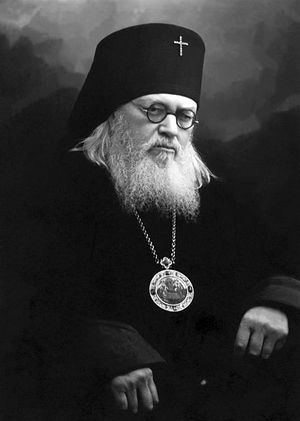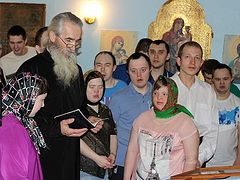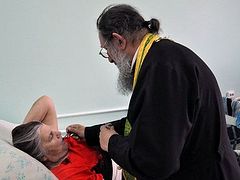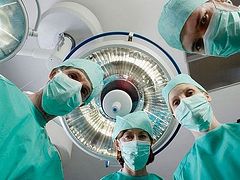Across the entire world operate hospitals large and small. They are designed to serve the sick, but of course, it was not always so. There were always doctors, but not always hospitals. Not in classical antiquity, among the pagans, nor ancient Romans.
When did the first hospitals appear? There are few who know that hospitals are in fact an invention of the Church. And we can say with confidence that this invention of the Church is an embodiment of the Christian love for mankind. The Church, seeing the needs of people, and their suffering, could not remain indifferent. Love always finds a way to serve one’s neighbor.
The fourth century was a turning point in the history of Christianity; persecution ceased, and the Church could breathe freely.
I will touch only on two great examples: the destiny of the Holy Hierarchs Basil the Great and John Chrysostom (The Golden-Mouth). To put it in modern language, these Saints carried out great social work. The scale of it is truly amazing. They both profoundly knew the social problems of their time and did not simply declare them and give advice on how to solve them. They solved them with their own sacrificial service to their fellow man.
Let me tell you a story from a time-period close to us. One day, the great Russian theologian, Father George Florovsky gave a report on social issues to members of one of the trade unions of France. The excellent report amazed everyone about how an Orthodox priest was so deeply versed in the issues of trade union activities. Perhaps he reworked the teachings of Marx in a Christian way.
The workers applauded enthusiastically, and Florovsky, in conclusion said that all the applause was not meant for him, but for Saint Basil the Great, for the speech was built on the text of one of Saint Basil’s sermons. The Saint’s thoughts have not lost their relevance to this day.
Who is Basil the Great? From a purely physical (earthly/materialistic) point of view, a weak man, burdened with many ailments, which were the cause of his early death (he died at age 49). But this man managed to leave behind a legacy of great social significance.
In the middle of the fourth century, famine broke out. Saint Basil, then a priest, immediately created free public canteens for those suffering from hunger. To achieve this, he had to fight, prove, hunt for, and even scream at the rich, to convince them to open their food supplies and share with the hungry.
It was then, during the terrible winter of 367 that Father Basil understood he needed to create his own organization—an institution that would serve the suffering. This strong man could patiently bare his infirmities, but he could not bare to see the suffering of others.
Becoming the Archbishop of Caesarea, Basil the Great continued the work he had begun to help the suffering. But here too, there was the resistance of heretics, ill-wishers, and the envious. The Emperor himself was against his idea. It seemed like a dead end, not to mention that he had his own illnesses.
But in the soul of this Holy Hierarch burned the fire of the Holy Spirit.
His enemies wanted to extinguish this flame, not knowing that it was impossible to extinguish the Spirit.
In 372, the famous complex was finally built, later called “The Basileiad”. The Holy Hierarch persuaded the rich to invest in this undertaking, and convinced the poor to participate in the realization of his idea.
In the center of the hospital complex there was a magnificent church, and around it there were structures, guest houses/hotels, schools, orphanages, homes for the poor, and the hospital itself. Such a thing had not existed anywhere else. Saint Basil personally supervised the work, gave advice to the builders, and worked himself.
When the construction of this magnificent city was completed—where the main focus was love for humanity—Basil the Great took over the leadership of one of the departments of the hospital.
Few people know that this Saint had seven diplomas of education—one of them being a diploma of medical education. Therefore, he decided to use one of his worldly professions in life.
He chose the most difficult thing—the quarantine department for the lepers. These unfortunate people were rejected by all, they were shunned, they lived in terrible agony; it was essentially like a very slow death. Basil the Great took their care upon himself. He himself bandaged and washed these patients, and not only that, he directly spent time with them, embraced them, seeing in everyone the Image of God.
It’s Unbelievable! A Bishop, a doctor, without a mask or gloves, without antiseptic means, cares for infectious patients, and washes out their wounds.
When Basil the Great died, all of Caesarea wept for him. During the funeral of the Holy Hierarch, there were so many people that many in the crowd fell in shock.
Gregory, a friend of Basil the Great said these words after the funeral, concerning the Basileiad Hospital:
“Come out, O Brothers, from your city, and behold this new city, where piety reigns, where the money of the rich citizens, at the request of Basil, is turned over to where it will not be stolen by anyone, and where time has no power of it. Here, they look at diseases philosophically, here, unhappiness turns to happiness.
If we compare the hospital of Saint Basil the Great with the richest cities, such as Thebes of Boeotia, Babylon, the Pyramids of Egypt and ancient temples, we see that nothing was left of all their former greatness. Even the very people themselves are no more.
But in the Basileiad hospital, we see people whom everyone rejected and hated because of their illness. And Basil the Great managed to convince us that if we consider ourselves humans, we can not neglect our own kind, for with our heartlessness and wickedness, we offend Christ Himself, who is the head of all.”
And now, a few words about another Great Saint—John Chrysostom. A strict ascetic, as a pastor, he showed a touching concern for suffering people, and he was closely involved in solving social problems. In Antioch, John Chrysostom fed over 3,000 people daily, and after coming to Constantinople, he already distributed food to 7000 daily.
These numbers are amazing when you consider in what years these events took place. John Chrysostom constantly helped his flock—both spiritually and materially. When in the evenings, his eyes were struck with fatigue, he used the chains that were attached to the walls in his chambers and practically bound himself to them, in order to stay on his feet and work. In the morning, he was already in a hurry to help people, although he himself was a weak and ill man.
Here is what his disciple Theodoret, Bishop of Cyrus (Cyrrhus) wrote:
“He is constantly laboring. Someone asks for his help in one thing, someone else in another. In court to deliver a defense speech, a hungry person asks for food, a poor person asks for clothes, often receiving the personal belongings of John Chrysostom. A mourner asks for comfort, a prisoner asks where to find shelter, someone in debt asks for help repaying it, those quarreling ask for him to make peace, a servant asks for protection from a cruel master, an orphan asks for comfort, a widow asks for alms. And this was every day! The Holy Hierarch was engaged in solving many problems for other people. To the sick he was a doctor, to the grieving he was a comforter. For anyone, he became everything.”
These two Saints, of which I have now told you, and the Gospel truths, undoubtably were a guideline in the life path of the Holy Hierarch Saint Luke (Voino-Yasenetsky) of Crimea (1877-1961+)1. Many moments of his life shock me. His cross of confession, patience in sorrows, sacrificial love for the sick and poor. Tired and persecuted, with a sore heart and swollen legs, Saint Luke [who was a doctor—Trans.] would stand at the operating table for hours to save the life of a patient. Here is how Doctor Kassirsky2 remembered the Holy Hierarch Luke:
“The whole life of Voino-Yasenetsky passed in the small cities of Russia, Turkmenistan, Siberia, and the Far East. He knew well poverty, hunger, and the high mortality rate from typhoid, diphtheria, malaria, cholera, and other diseases. He survived two world wars, which killed millions of people. He saw, and was himself subjected torture, he saw the devastating consequences of the Nazi invasion, saw the destroyed cities, knew about the murders and torments, how the nation was mercilessly robbed, and he never separated himself from the events surrounding him. He made a great contribution to the cause of the salvation of mankind.”
These words of Kassirsky caused me to remember two incidents in my life. One occurred in 1976 on the island of Kerkyra3 (Corfu), where I served as a deacon. I was traveling by bus, there was no space and so I stood. This was the period after the fall of the dictatorship of the “black colonels” [the Greek military junta of 1967–1974—Trans].
Many then raved about leftist ideals, talking about progress. Two young men were sitting and discussing Marx’s theory about revolution4, which will [supposedly] bring people a better life. At one of the stops, a blind man entered the bus. I imagined that these supposed fighters for human happiness would certainly then give up their seat for a disabled person, but instead, I heard the following tirade:
“See, if our country were socialist, the state would organize a right-proper transport operation. People could move in comfort, and this blind person would have a place to sit!” And then, the young men calmly continued their discussion of Marxist theory [without even thinking to help the man by sacrificing their seat—Trans.]
The second case is taken from the life of Greece today, during the time of the crisis. Many of our citizens went broke, many really had nothing to eat. The Greek Orthodox Church, from the first days of the crisis began to feed the hungry. 25,000 servings of hot meals were distributed to people daily. Everyone welcomed this initiative. But there were also fanatics, leftists, thirsting for World Revolution, who objected, saying: “The position of the Church is not right! If people will be fed, they won’t fight, they won’t resist the regime”.
That is to say, our opponents quite seriously feel that you need to take the path of violence, blood and anger, and not follow the path of Christian love. You can draw your own conclusions.
Saint Luke thought differently. I will again quote Dr. Kassirsky:
“He believed in Christian love, believed that the tragedy in the history of his country could only be healed with Christian love. And Archbishop Luke never changed these views of his.”
Often in our monastery, people come and tell about the miraculous participation of the Holy Hierarch Luke in their lives. Many of these stories are striking to the core. I wondered: Just why did the Holy Hierarch Luke receive such grace from God and become so glorified? The answer, I found through Saint Maximus the Confessor, who said the following:
“The person, in whom love lives, receives from God the gift of miracles.”
Love is the main virtue, and it brings us closer to God, for He Himself is Love. Love is not beautiful words, love is works. You are doctors. You are doctors. You have a great privilege over others: you by your service are called to give love. As one Elder from the Holy Mountain said: “For a Doctor the gates of heaven are always open.”
Let me end with the words of a friend of mine who recently published a small, but very good book. He writes:
If you attend all church services, exhaust yourself with fasting, learn the entire Bible by heart, but you have not fulfilled what Christ said:
I was hungry, and you fed me. I was thirsty, and you gave me drink. I was naked, and you gave me clothes. I had no home, and you gave me shelter. I was in prison, and you visited me.
If you never did that, then you are simply a sounding brass.5 (1 Corinthians 13:1) He who seeks God within [the confines of] this physical world will not find Him anywhere, except in the form of the sick, the hungry, prisoners, and the destitute. If a person does not hear the cry of the hungry and destitute, he does not hear the voice of God.
Dogmatic dissertations are about as interesting to me, as the issues of the classification of insects. The face of Christ is lost among the theorists of spiritual formulas concerning essences, and Hypostases. And I personally think,”—continues my [the Author’s] friend—“that the one who washed at least one patient, who was lying seriously ill, is above all the titans of theology combined.”6
I have known many great people in my life—writers, philosophers, scientists. Some of them were endearing to me, and it was interesting with them. I could give them a rating, praise when it stands to be given. But I can give a moral assessment only when I see that these people were close to gravely ill patients, and they helped them without self-interest, selflessly and with love. Only such people do I consider to be disciples of Christ.







Honestly ... God bless you guys for all the hard translation effort, the great deal of time and stress no doubt that was undertaken to translate all these articles. It is probably no easy task.
I read a lot of the articles and consider orthochristian.com and pravmir.com to be the greatest two English websites globally of true Orthodox Christianity. In my opinion they are the most worthwhile and holiest English websites in existence.
I think God may have let the internet to be created perhaps solely that Orthodoxy could be spread through these two blessed websites.